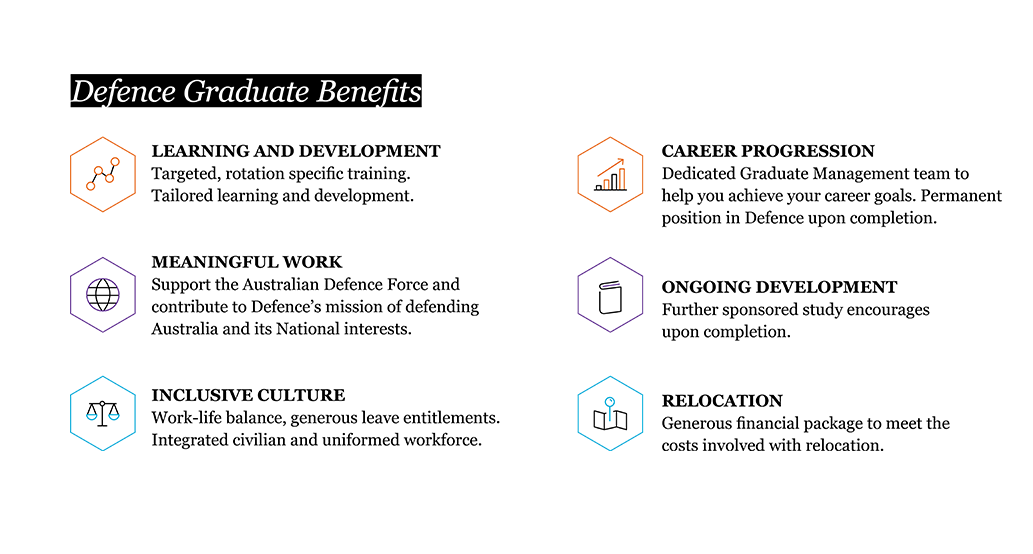Department of Defence
Defence Graduate Program – Defence Intelligence Organisation
Opportunity expired
Opportunity details
- Graduate Job or Program
- $68,442 pa + 15.4% superannuation. Upon successful completion of the program, graduates will advance to APS 4: $76,215 pa + 15.4% superannuation.
- Apply by 18 Apr 2020

- Influence strategic policy guidance for Defence and the Australian Defence Force
- Become tomorrow's leader and shape the future for a more secure Australia
- Inform decision-making at the highest levels of Government
- Make a real contribution to the ongoing security of Australia, and Influence strategic policy guidance for Defence and the Australian Defence Force.
As a Defence Intelligence Organisation (DIO) analyst, you will provide strategic intelligence analysis to the Defence Minister, senior Defence staff, other Government agencies and policymakers. Your assessments and advice will help the Australian Government and the Australian Defence Force understand international developments and how they affect Australia's security. Your work as an analyst will include supporting Australian civilian and military Defence personnel deployed on operations around the world, by identifying vulnerabilities and potential countermeasures to mitigate this risk.
There are a number of analyst positions in DIO including:
- An Intelligence Analyst within DIO conducts all-source analysis focusing on support to military operations; terrorism; regional security; foreign military capabilities; cyber threats; Defence-related technologies; political; economic; geographic and thematic issues.
- A Scientific Analyst within DIO conducts unique specialist all-source analysis focusing on specific areas of military interest, including nuclear, chemical and biological proliferation; strategic health issues; emerging technologies; and WMD-related weapons systems. This analysis informs whole-of-government consideration of major development projects and policy objectives regarding WMD and strategic health issues.
- A Technical Analyst within DIO conducts an all-source analysis of threat weapons systems and platforms, including future threat. They may also look at emerging and disruptive technologies with military applications and may also conduct complex modelling and simulation activities and work on signatures predictions. This analysis informs government consideration of major acquisition projects worth billions of dollars, such as the future submarines, the F-35 Joint Strike Fighter and the Air Warfare Destroyer.
Throughout your career as a DIO analyst, you will be encouraged to develop novel analytic approaches and test conventional thinking. You will personally brief senior Defence officials, and build highly effective and collaborative professional relationships with intelligence customers and collectors. You will work in a supportive, collaborative and encouraging environment that will challenge, extend and reward you.
We are interested in graduates from a wide range of disciplines including, but not limited to, international relations, arts/humanities, physics, mathematics, engineering, science and technical qualifications.
In all of DIO's analytic roles, you will be given the opportunity to advance your subject matter expertise and to develop your intelligence tradecraft skills through an extensive training program and attendance at a wide variety of domestic and international forums.
Quick Details
Salary: $68,442 pa + 15.4% superannuation. Upon successful completion of the program, graduates will advance to APS 4: $76,215 pa + 15.4% superannuation.
Program: 12 months - 3 x 4 month rotations
Eligibility: Australian Citizens only
Location: Canberra (limited interstate rotations outside of Canberra are available, however, final placement will be in Canberra)
Reviews
They are different every day but I have had the opportunity to draft emails, documents and undertake academic research as part of developing doctrinal policy.
- Document review, editing and drafting. - Handling correspondence for projects - Attending meetings - Stakeholder engagement (both internal and external)
Policy writing, decision making, liaising with other areas of Department . These roles and responsibilities are very rewarding
About the employer

Department of Defence
4.1
1,000 - 50,000 employees
Government & Public Service
Bring your unique skills and experiences to a world of opportunity at Defence.
Pros and cons of working at Department of Defence
Pros
Opportunity to learn and exposure to a vast array of experiences. Sense of pride in working on behalf of the Australian people and for the defence of the country.
The support for learning development opportunities and ongoing exposure to networking opportunities.
The department is very flexible when it comes to hours, including making ample arrangements to work from home if necessary.
I have had the opportunity to draft emails, documents and undertake academic research as part of developing doctrinal policy.
They are supportive and are good mentors in teaching the internal procedures that otherwise would not be shared if not directly exposed to them.
Cons
Workplace culture is heavily dependent on the dedication of the supervisors and senior leaders which varies depending on the work area.
When all workplace employees are working on-site there is often a shortage of desks which is inconvenient for all involved.
Can be very slow to hear updates.
There is a good mix of women, ethnic minorities, etc., but this seems to be very aggregated in certain groups/services—not so much integrated or dispersed across the department.
I am unsure of my current knowledge or capacity to comment on their sustainability efforts.